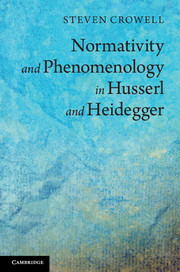Book contents
- Frontmatter
- Contents
- Acknowledgments
- Citation conventions for the works of Husserl and Heidegger
- Introduction
- Part I Transcendental philosophy, phenomenology, and normativity
- Part II Husserl on consciousness and intentionality
- 4 The first-person character of philosophical knowledge
- 5 Phenomenological immanence, normativity, and semantic externalism
- 6 The normative in perception
- 7 Husserl’s subjectivism and the philosophy of mind
- Part III Heidegger, care, and reason
- Part IV Phenomenology and practical philosophy
- References
- Index
5 - Phenomenological immanence, normativity, and semantic externalism
Published online by Cambridge University Press: 05 April 2013
- Frontmatter
- Contents
- Acknowledgments
- Citation conventions for the works of Husserl and Heidegger
- Introduction
- Part I Transcendental philosophy, phenomenology, and normativity
- Part II Husserl on consciousness and intentionality
- 4 The first-person character of philosophical knowledge
- 5 Phenomenological immanence, normativity, and semantic externalism
- 6 The normative in perception
- 7 Husserl’s subjectivism and the philosophy of mind
- Part III Heidegger, care, and reason
- Part IV Phenomenology and practical philosophy
- References
- Index
Summary
In 1975 Hilary Putnam published “The Meaning of ‘Meaning’,” in which he argued that “‘meanings’ just ain’t in the head” (1975b, p. 227). In the debate that arose around this thesis in the 1980s and 1990s, the term “internalism” came to be used for the thesis that Putnam criticized, while “externalism” named a cluster of alternative positions. With few exceptions, phenomenologists did not participate in this debate. There were many reasons for this, but one of them, surely, is well expressed by Felix O. Murchada. “Far from being enlightening,” Murchada writes, the distinction between internalism and externalism “actually obscures the understanding of both Husserl and Heidegger” (2003, p. 98). The reason, he thinks, is clear: already in Husserl “the reduction … set[s] the very distinction of internalism and externalism aside.” Dan Zahavi reaches a similar conclusion: “In my view, the phenomenological analyses of intentionality (be it Husserl’s, Heidegger’s or Merleau-Ponty’s) all entail such a fundamental rethinking of the very relation between subjectivity and world that it no longer makes much sense to designate them as either internalist or externalist” (2004, p. 53).
While I share these views, the concept of phenomenological immanence, which results from the reduction and is crucial to the kind of “fundamental rethinking” Zahavi invokes, remains a difficult one, and it seems to me that the debate over internalism and externalism can provide a useful framework for clarifying it. As I shall argue, what is distinctive about phenomenological immanence is that it is normatively structured and so contrasts sharply with the Cartesian-psychological forum internum of standard internalism, a conception of “the head” that is shared by standard externalism. In this, phenomenological immanence bears an interesting relation to the “space of reasons” articulated in Robert Brandom’s pragmatic inferentialism, which likewise tries to get beyond the assumptions of the internalism/externalism debate.
- Type
- Chapter
- Information
- Normativity and Phenomenology in Husserl and Heidegger , pp. 101 - 123Publisher: Cambridge University PressPrint publication year: 2013



